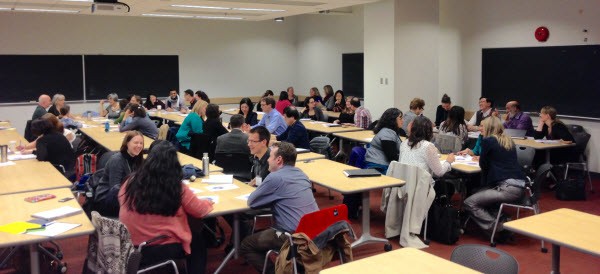This past Wednesday, February 18th marked the second annual UBC Advising Conference. Advisors from across both campuses were invited to come together to explore the ways that we help students, and what the future holds.

Dozens of workshops were offered by our colleagues throughout the day. One of my favourites was “Emerging Research in First Year Student Transition Experiences at UBC” led by Doctors Amori Mikami and Frances Chen, both faculty members in Psychology. Their research shows that early social connections (even within the first two weeks of arriving at UBC) predicted how students performed academically, and how attached students felt to UBC at the end of their first year! It was very interesting and applicable.
Other notable presentations included the keynote by Dr. Shimi Kang, and the closing session presented by Dr. Michael Griffin. Dr. Kang is a Clinical Associate Professor in the Faculty of Medicine at UBC, mental health and motivational expert, celebrated author, and engaging presenter. Her best-selling book, “The Dolphin Way,” shares evidence based strategies with parents and educators to help cultivate health, happiness, and motivation in youth. She adapted this concept for our Advising community, and inspired us to see the value in finding balance and motivation in our own work, so that we can empower our teams and support students towards the four skills of the 21st century; creativity, collaboration, critical thinking and communication. Dr. Kang shared her extensive research on Generation Z and motivation to help us better understand how to adapt to change, what motivates us, and how our vision of the future and expectations of experience can influence education and societal change.
Dr. Griffin believes we’re used to thinking of the undergraduate classroom and co-curricular support as two different things. But he posits that that’s actually a new idea: until the last century, they were deeply intertwined. In his presentation, he explored how the UBC Professor-in-Residence program is working to bring academics and residence life closer together, focusing on the promise of student-faculty collaboration (with a live-in research professor), new communication media, and lessons learned so far. He closed by considering the interplay of research, teaching, and advising in graduating imaginative citizens with an creative and empathetic vision of the future.
What was your favourite part of the conference? Let us know in the comments! And, of course, attendees should be sure to fill out the feedback survey.
